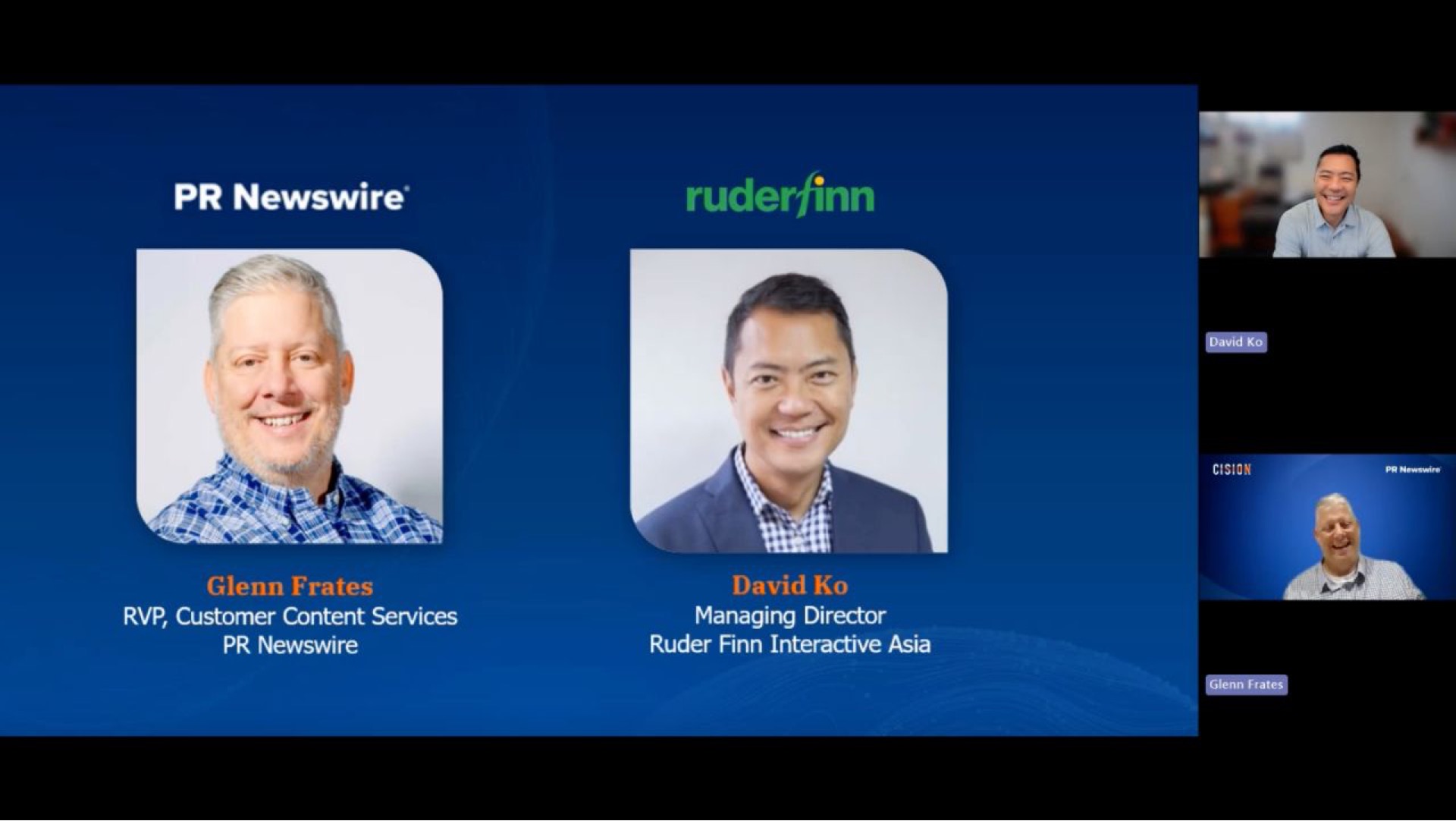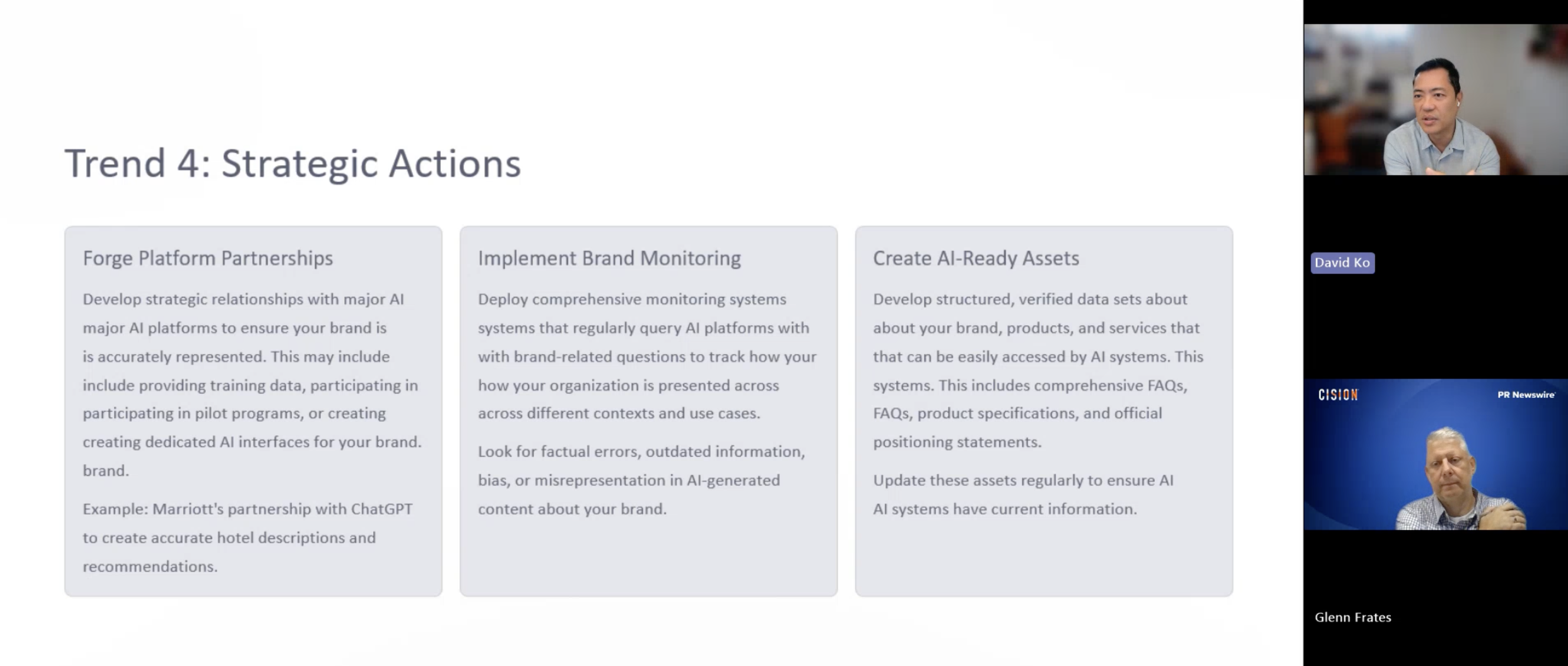It's clear that the move from traditional keyword-based search to conversational, AI-driven information isn't just a trend – it's a fundamental change that requires a new approach to public relations.
In case you missed it, the webinar on-demand is now available to watch here.
The core message of our conversation was simple: as AI becomes the primary interface for information discovery, brands must evolve from simply chasing clicks to becoming a trusted, conversational authority. Your brand's voice needs to be a part of the AI-driven dialogue, not just a link at the bottom of a search results page.
This shift presents both challenges and opportunities. The challenge lies in a world where a user's question is answered directly by an AI, potentially without them ever visiting your website. The opportunity, however, is immense. By optimizing for these new platforms, you can become the definitive source of truth for your audience, building trust and authority that goes far beyond a single transaction.
Strategic Takeaways
- Be AI-Visible: Structure your content for AI comprehension using clear hierarchies, factual statements and comprehensive FAQ resources. Prioritize authoritative and verifiable information that AI systems can confidently cite.
- Measure Differently: Develop new metrics beyond website traffic that capture brand presence in AI-generated content, zero-click environments and synthetic media. Track mention accuracy, sentiment and contextual relevance.
- Segment Deeply: Embrace the fragmented media landscape by creating content strategies tailored to micro-communities. Use AI tools to personalize messaging while maintaining consistent core brand positioning.
- Guard Your Brand: Proactively manage how AI platforms represent your organization. Establish regular monitoring protocols and develop relationships with key AI platforms to ensure accurate representation.
FAQ: Your Questions Answered
We received a wealth of excellent questions after the webinar. Here are answers to some of the most pressing and impactful ones that help to summarize the key messages from our session:
1. What is the new way of measuring success for campaigns/PR efforts if clicks and reach are not as measurable as before?
The new metrics for success will focus on brand authority and presence within the AI ecosystem.
Since nearly two-thirds of Google searches end without a click, traditional metrics like website visits are becoming less relevant for measuring impact. Instead of just tracking clicks, we need to look at new KPIs like:
- AI-Generated Mentions: Is your brand mentioned by name in AI-generated answers to relevant queries?
- Share of Voice (AI-Optimized): How often is your brand cited as the source of information compared to competitors when a user asks a question about your industry or product?
- Brand Sentiment: Is the sentiment associated with your brand in these conversations positive?
- Direct Conversational Engagement: Are you seeing more direct inquiries or bookings that can be attributed to your brand being the definitive answer for a query, even if the user didn't click through from a traditional search?
2. How do I get my keywords ranked in AI Search?
Ranking in AI search is fundamentally different from traditional SEO. It's less about a single keyword and more about being the most relevant, comprehensive, and authoritative source of information for a topic. To "rank," you need to:
Optimize for AI Summarization: Structure content with clear headings, concise paragraphs, and factual statements that AI can easily extract.
Develop FAQ-Rich Resources: Create comprehensive FAQ sections that directly answer the specific questions your audience is asking. AI search tools prioritize content that directly answers natural language questions with authoritative information.
Leverage Structured Data (Schema Markup): Use schema markup to explicitly tell AI what your content is about. This helps it understand your content and its context more accurately.
3. What are some practical steps smaller comms teams (with limited budget) can take to adopt AI search without overhauling everything?
You don't need a massive budget to get started. Here are some practical, low-cost steps you can take:
- Conduct an "AI-Readiness" Audit: Ask common questions about your brand and industry using AI tools like ChatGPT or Copilot to see how your brand is represented. This gives you a starting point.
- Prioritize Foundational Content: Focus on creating high-quality, authoritative content that answers the most common questions your audience asks. This evergreen content will provide long-term value.
- Update Existing Content: You don't have to start from scratch. Go through your top-performing blog posts and web pages and restructure them to be more "AI-friendly" by adding Q&A sections and clear summaries.
- Use Free AI Tools for Inspiration: Use tools like ChatGPT to brainstorm common questions related to your brand. Use these as a guide for your content creation strategy.
4. How can we align junior team members with the use of AI as a tool, and not have them engage with it as a cure-all?
This is a critical point. The best way to align junior teams is through clear guidelines and education.
Emphasize "AI as an Assistant": Frame AI as a powerful tool to automate and accelerate tasks, not a replacement for critical thinking. For example, use it to generate a first draft or to research a topic, but stress the importance of human editing, fact-checking, and adding unique insights.
Set Clear Policies: Establish clear rules on what types of data can be entered into AI tools and what needs to be verified.
Encourage Critical Scrutiny: Teach team members to be skeptical of AI-generated information. Make fact-checking a mandatory step in their workflow. This not only ensures accuracy but also builds a more skilled and discerning team.
Provide Training and Case Studies: Offer internal workshops that show how AI has successfully helped with specific PR tasks (e.g., drafting a press release, analyzing social media sentiment) while highlighting where it can go wrong.
5. How do agents play a role?
Agents, or PR professionals, are more critical than ever in the AI era. Their role shifts from simply distributing content to a more strategic, nuanced function.
Strategic Architect: Agents will become the architects of a brand's AI-optimized presence. They will strategize how a brand's voice and message are integrated into AI conversations, ensuring accuracy and brand consistency.
Trust and Reputation Guardians: With the risk of misinformation, PR professionals will be the frontline guardians of a brand's reputation. They will monitor how it's being represented by AI and take swift action to correct inaccuracies or misrepresentation.
Content "Sourcing" Experts: They will identify the critical information AI models are pulling from and work to ensure a brand's owned channels are the most authoritative and trustworthy source for that information.
Human Touch and Creativity: While AI can generate content, it lacks the creative, empathetic, and strategic thinking that defines great PR. Agents will continue to be the source of innovation, relationship-building, and high-impact storytelling that AI cannot replicate.
Ready to get found in the new era of search?
As AI reshapes how people find information, your business needs a strategy that goes beyond traditional SEO.
Learn how press releases can help you build authority and appear in AI search results. Read "How Press Releases Make Your Business Discoverable in AI Search" to find out more.
About Glenn Frates
Glenn Frates is Regional Vice President of U.S. Distribution at Cision. Glenn’s 20+ years experience in content distribution and best practices, global marketing strategies and large-scale operations management has provided him a broad perspective on what does and doesn’t work well in the Marketing/PR arena.


